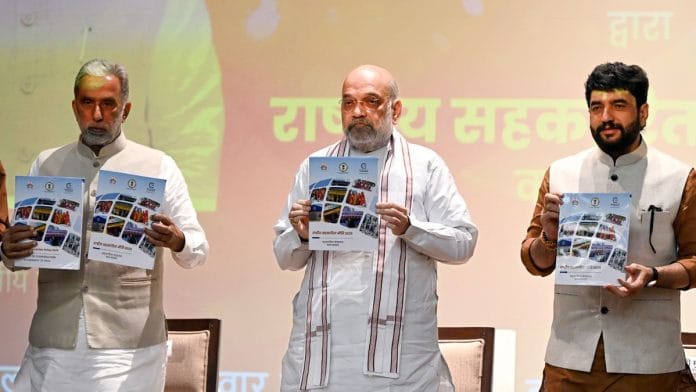New Delhi: The Narendra Modi government Thursday unveiled the National Cooperative Policy 2025 that promises to give more autonomy to cooperatives, ensure availability of affordable credit for them, and promote their entry in new and emerging sectors.
Union Home Minister and Minister of Cooperation Amit Shah launched the policy, which will replace the one in place since 2002.
The previous policy focused on the basic dimensions of efficiently organising economic activities by cooperatives. But over the last 20 years, with globalisation and technological advancements, it was felt that the policy needed to be revisited to suit the evolving requirements of the cooperative sector, and ensure its sustainability in the current economic scenario.
“In 2020, many learned individuals said that cooperatives is a dying sector, but today the very same people say that cooperatives have a future,” Shah said. He added that the first cooperative policy was launched in 2002 by Atal Bihari Vajpayee’s BJP government, and now the second cooperative policy of 2025 is also being launched by the BJP government of Prime Minister Modi.
Currently, there are more than 8 lakh cooperative societies (credit and non-credit) in the country with more than 30 crore members.
Under the National Democratic Alliance (NDA) government, there has been a big push to bolster the cooperative sector. The Ministry of Cooperation was set up for the first time in July 2021 to focus and look into the affairs of the sector, with Shah at the helm of affairs.
Also Read: Gujarat sees highest coverage under PM’s rooftop solar installations scheme; Bengal, Jharkhand lag
Autonomy, transparency & diversification
The 2025 policy encourages states and Union Territories to suitably amend their respective Cooperative Societies Acts and rules, and cooperatives’ bye-laws.
It aims to ensure free and fair election of directors and office bearers, and transparent recruitment processes. States will also be required to create a new cooperative policy allowing both Centre and the respective state government to work towards common goals.
“Under the new policy, every village of the country will have a cooperative society within five years,” Shah said Thursday.
The target is to set up 2,00,000 Primary Agricultural Credit Societies (PACS) by February 2026. The policy aims to strengthen the role of PACS by designating them as implementing agencies for various government schemes at the grassroot level, and incentivising the well performing ones.
“The policy also encourages cooperative banks to expand their reach and scope by opening new branches, and diversifying financial products and services, subject to viability to increase their footprints,” the policy document states.
To strengthen the cooperative structure and promote its entry in new and emerging sectors in both urban and rural space, the policy encourages primary cooperative societies to convert into multipurpose cooperatives to diversify their businesses into new areas, such as PM Jan Aushadhi Kendra, warehousing, fair price shops, and LPG distributorship, among others.
Shah also emphasised the importance of cooperatives to diversify and enter new and emerging sectors, essential for future growth. “Work has already started in the field of health, taxi and insurance, along with planning for sectors like tourism and green energy.”
The policy was drafted by a 48-member committee headed by former Union minister Suresh Prabhakar Prabhu, along with members of national/state cooperative federations.
At the launch event, Prabhu said, “It is the youngest ministry in the government, having been created in 2021, but has done the maximum work in the last four years.”
The policy also mandates the creation of sector and state-wise performance indices to rank the cooperatives on a continuous basis via a web portal to promote healthy competition. To drive international growth, it encourages cooperatives to identify and align with export-oriented products.
It also encourages more participation from women, youth, marginal farmers and weaker sections of society (Scheduled Castes/Scheduled Tribes, specially-abled, and so on) in cooperative work.
(Edited by Mannat Chugh)
Also Read: Once male bastion, Indian Forest Service is now only civil service with all-women national executive






